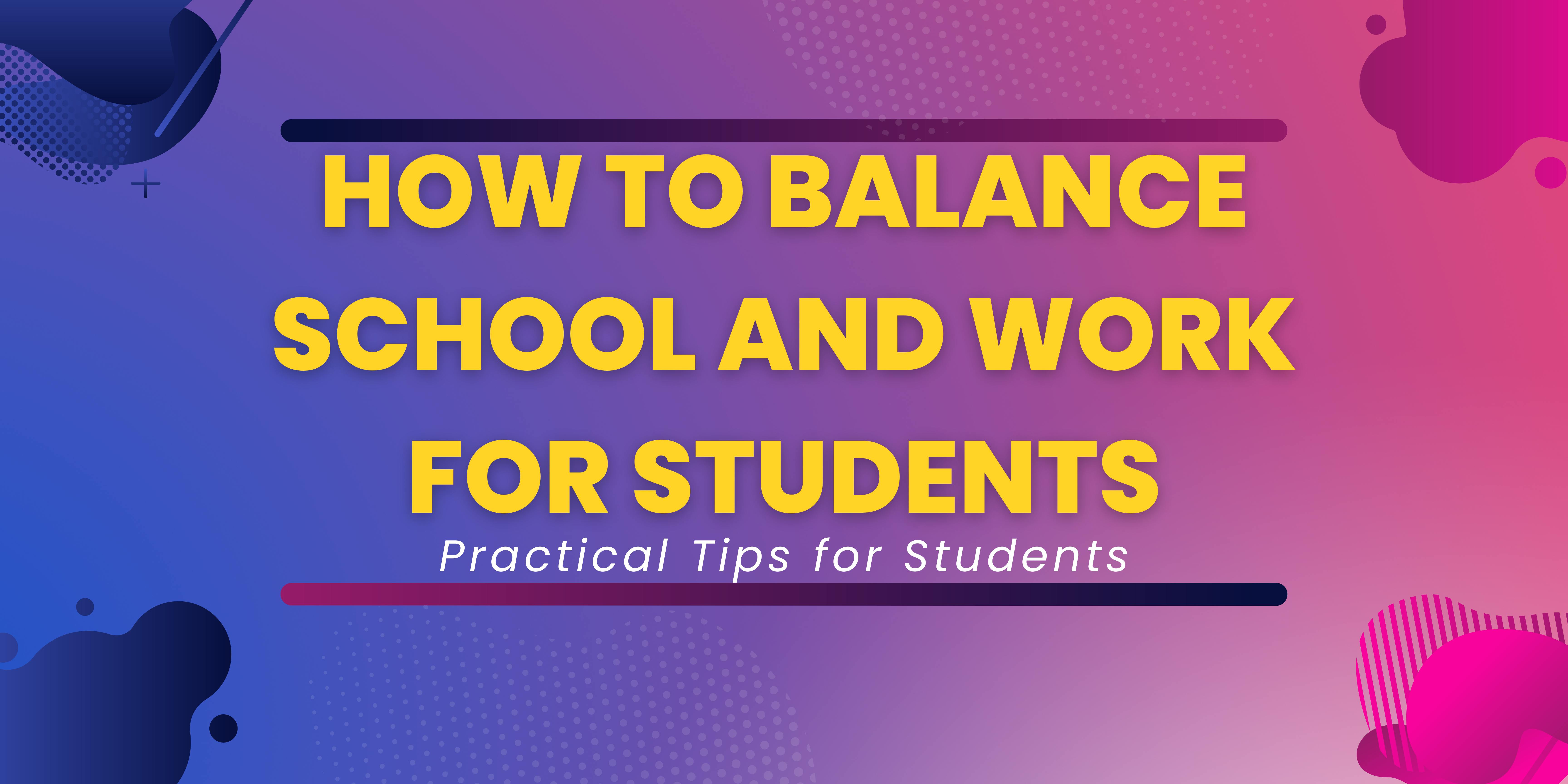
How do you balance school and work?
One of the major questions I have seen on social platforms is “How do I balance school and work as a student and still be good at both?” Juggling classes, assignments, and a job isn’t easy, and it often feels like there aren’t enough hours in the day. But don’t worry – it’s possible to find a balance. This guide is here to offer you effective strategies and practical tips to help you manage both academic commitments and work obligations efficiently.
We’ll explore how to synchronize your work with your academic goals, make the most of flexible study options, and develop smart study habits. Additionally, we’ll discuss the importance of setting boundaries, being efficient at work, and taking care of your physical and mental health. By the end of this guide, you’ll have a toolkit of techniques to help you excel in both your studies and your job, all while maintaining your well-being.
Combining Work and School for Success
Making your job and school work together can really help you now and in the future. Here’s how to do it:
Choose Jobs That Help You Learn
Find Work That Matches What You Study
Look for jobs or internships that are related to what you’re studying. For example, if you’re studying art, try to work at an art gallery or a museum. This way, you get real experience that makes what you learn in school clearer and more useful.
Get Paid and Learn at the Same Time
It’s better to have a job that pays you. Not only do you earn money, but you also get to learn things that help in school. Some jobs might even help pay for your classes.
Use Your Job to Make Connections and Learn Skills
Meet People Who Can Help You Later
At work, try to meet people who work in the field you’re interested in. These people can give you advice, help you find a job in the future, and teach you things about the work you want to do.
Learn Skills You Can Use Anywhere
Jobs teach you skills like how to talk to people, work in a team, and solve problems. These skills are useful for all kinds of jobs, not just the one you have now. They can help you in school and in any job you have in the future.
Learn Practical stress management strategies for students
Find Academic Flexibility
Finding flexible ways to fit your school schedule around your work can make a big difference. Here’s how to use flexible study options and online tutoring to balance your work and study:
Explore Flexible Study Options
Tailoring Your Academic Schedule
Look for classes that fit around your job, like evening classes or online courses. This allows you to work during the day and learn at times that suit you best, keeping up with both your job and your studies.
Utilizing Academic Resources
Take advantage of the help your school offers. Academic advisors can guide you in choosing classes and planning your schedule to fit with your work commitments. This support can significantly ease managing your time and responsibilities.
Incorporate Online Tutoring
Access to Expert Help
Online tutoring can be a game-changer, especially if you’re juggling work and school. It offers flexible and personalized learning support, allowing you to get help in specific areas where you need it, at times that suit your busy schedule.
Advantages of Online Tutoring
With online tutoring, you can study from anywhere, saving travel time. Tutors are often available outside of typical school hours, making it easier to fit in study time around your work. Additionally, the one-on-one attention can help clarify difficult concepts and keep you on track with your coursework. We provide online tutoring in accounting and finance to help students achieve academic success.
Prioritizing and Time-Blocking
Good time management is crucial when you’re handling both work and school. Here’s how using a planner and time-blocking can make a big difference:
Use a Planner or Digital Calendar
Effective Time Management Techniques
Time-blocking means planning specific times for studying, working, and relaxing. By scheduling your activities, you stay organized and ensure you give enough attention to each part of your life.
Completing Assignments in Good Time
Avoid the stress of last-minute work by scheduling time to complete assignments well before their due dates. This approach not only reduces anxiety but also allows time for reviewing and refining your work, leading to better grades.
Balancing Responsibilities
Regularly check your school or course schedule for upcoming due dates for quizzes, assignments, reports, and exams. Adjust your time blocks accordingly to ensure you handle these tasks on time. Regularly updating your schedule prevents overcommitment and helps you stay on top of your responsibilities without getting overwhelmed.
Learn to Say No
Learning to say no is a big part of managing your time well when you have both work and school. Here’s why it’s important and how to do it:

Recognize Your Limits
Setting Boundaries
It’s really important to know your limits. If you have too much to do, it’s okay to say no to extra tasks. This helps you avoid getting too stressed or tired, and makes sure you can do your best in both your job and your studies.
Quality Over Quantity
Instead of trying to do everything, focus on a few important things. This way, you can do those things really well. Doing a few things better is more rewarding and keeps your work and study life balanced and enjoyable.
Efficient Study Habits
Good study habits can make a big difference when you’re balancing work and school. Here are some ways to study smarter:
Adopt High-Impact Study Techniques
Smart Study Strategies
Use active learning methods like summarizing what you’ve learned, teaching concepts to friends, or applying what you learn in class to real-life situations. These methods help you understand and remember your studies better.
Utilizing Technology and Resources
Use educational apps and online resources to help with your studies. They’re great for when you can’t be in a classroom or library, and they can make learning more efficient and fun.
Use Productivity Tools
There are various productivity tools available that can help you manage your time and tasks better. Try using Pomodoro timers to break your study sessions into focused intervals, to-do list apps to keep track of assignments and deadlines, and note-taking software to organize your study notes efficiently. Experiment with different tools to find what works best for you, and use them to make your study sessions more productive.
Learn how to make the most out of your University life.
Work-Smart Strategies
Being efficient at work helps you have more time for school. Here’s how to work smarter:

Be Productive at Work
Enhancing Workplace Efficiency
Find ways to do your job better and faster. This could mean organizing your tasks better, making repetitive tasks simpler, or using technology to do some of your work for you. The more efficiently you work, the more time you’ll have for school.
Professional Development
Look for chances to learn new skills at work. These skills can help you in your current job and in your future career. They might even help with your schoolwork.
Self-Care and Stress Management
Taking care of yourself is really important when you’re busy with work and school. Here’s how to stay healthy and manage stress:
Maintain Physical and Mental Health
The Importance of Self-Care
Make sure to exercise regularly, eat healthy foods, and get enough sleep. Taking time for things you enjoy, like hobbies or mindfulness practices, is also important to keep stress under control.
Seeking Support
Don’t be afraid to ask for help. Talk to counselors, join support groups, or find a mentor. These people can give you advice and support when things get tough.
Conclusion
Finding a good balance between school and work involves careful planning, smart working methods, and taking good care of yourself. Try using these strategies to manage your responsibilities better. With a bit of practice, you’ll find a way to make both work and school fit into your life comfortably.
Do you have your own ways of balancing school and work? We’d love to hear about them! Share your tips and experiences with us. Your insights could help others who are trying to find their balance, too. You may also reach out to us if you need help with planning your work and study.
"Are you tired of struggling in accounting class? Let us make accounting easy and enjoyable for you."







